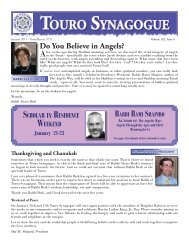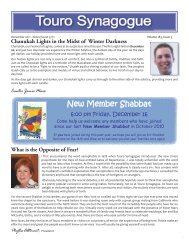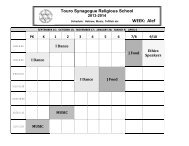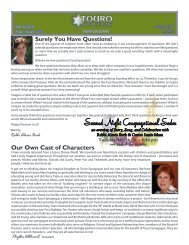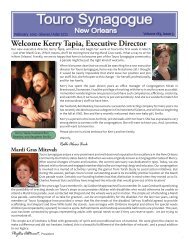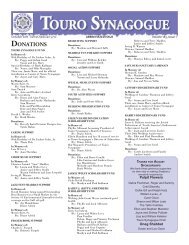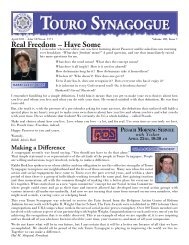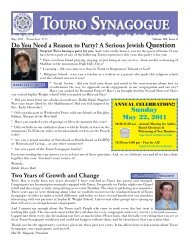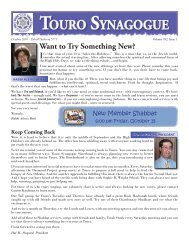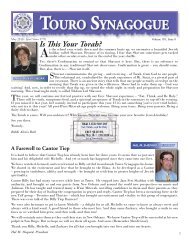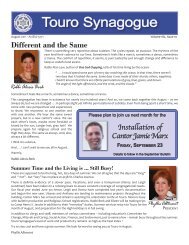Reform Judaism for Teachers module - Touro Synagogue
Reform Judaism for Teachers module - Touro Synagogue
Reform Judaism for Teachers module - Touro Synagogue
Create successful ePaper yourself
Turn your PDF publications into a flip-book with our unique Google optimized e-Paper software.
Introduction<br />
Lesson #1<br />
How Our Past Affects our Future<br />
This lesson introduces participants to three pivotal time periods in Jewish<br />
history. Two of these—the era of Rabbinic <strong>Judaism</strong> (70‐500 C.E.) and the Haskalah, or<br />
Jewish Enlightenment (1650‐1850) — greatly influenced the development of <strong>Re<strong>for</strong>m</strong><br />
<strong>Judaism</strong>. The third period, the Holocaust (1939‐1945), had a profound impact on key<br />
aspects of the Movement’s philosophy.<br />
Understanding the events that have shaped our Movement in the past can be<br />
extremely helpful in giving students a context within which to evaluate our choices as<br />
we move <strong>for</strong>ward in history. The emergence of Rabbinic <strong>Judaism</strong> and the introduction of<br />
the Talmud that followed the destruction of the Second Temple in Jerusalem (70 C.E.)<br />
provided a model <strong>for</strong> reinterpreting text to reflect the circumstances of the time. During<br />
this period, our Sages and scholars worked to record both oral and written laws and<br />
commentaries, initiating a process that in some respects continues to this day.<br />
The Enlightenment, or Haskalah, brought about an age of struggle and<br />
uncertainty as Jews began to search <strong>for</strong> new ways to reconcile living in the modern<br />
world with their Jewish identity. The Enlightenment followed a period of major anti‐<br />
Semitic persecutions, including the Crusades, the Spanish Inquisition and the<br />
Expulsions. The ideals of the Enlightenment, most notably embodied in the credo<br />
espoused in The French Revolution (“liberty, equality, fraternity”) called <strong>for</strong> elimination<br />
of the different treatment of people based upon their religion or social background. This<br />
opened a world of choice <strong>for</strong> Jews, many of whom abandoned <strong>Judaism</strong> in order to<br />
assimilate into the larger European culture.<br />
Un<strong>for</strong>tunately, however, the horrors of the Holocaust followed the<br />
Enlightenment only one or two centuries later, <strong>for</strong>cing even the most liberal of Jews to<br />
face the harsh reality that a universalistic perspective does not necessarily mean full<br />
acceptance. Rabbi Eugene B. Borowitz describes the shift in <strong>Re<strong>for</strong>m</strong> Jewish thinking that<br />
Union <strong>for</strong> <strong>Re<strong>for</strong>m</strong> <strong>Judaism</strong>-Department of Lifelong Jewish Learning<br />
1



